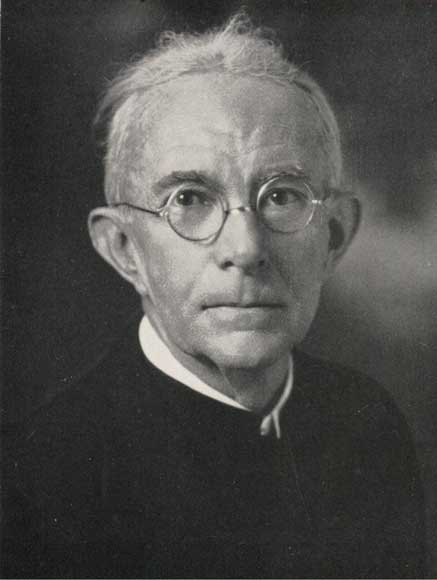Celebrating the life of a historian
Birdwell pays tribute to George L. Crocket

In March of 1931, President Birdwell notified the Board of Regents: “Through the generosity of friends of the college, we have been able to add Dr. George L. Crocket to our staff as Professor of History Emeritus.” After just five years at SFA , Crocket died in 1936. Birdwell’s tribute to Crocket, reproduced in part below, tells us as much about President Birdwell’s sense of values as it does about Crocket’s life and works. Birdwell’s reasons for hiring Crocket paralleled those he offered when he hired Karle Wilson Baker back in 1924. The President wanted the students at SFA to come in contact with first class intellects, who were also fine citizens and good people.
Crocket was a wood carver and an artist as well as a historian. He did the wood carvings at the altar at the Christ Episcopal Church. Crocket also did a wood carving of Dr. Birdwell which will soon hang again in the new Alumni Office. While he donated his religous books and papers to Episcopal Church, he willed his historical works to SFA. (JLJ)
Dr. George L. Crocket -- An Appreciation
“He did right in the sight of God and was gathered unto his fathers.” This is the biographical sketch of many of the men of the Bible. It tells the story of Dr. Crocket’s life. ... I think I have never known a man who was so utterly unselfish. ... I came in contact with him first in trying to help the boys of East Texas through the Boy Scouts organization. I found that Dr. Crocket was a genuine pioneer in this movement. ...
About a half a dozen years ago, Dr. Crocket was invited to become Professor Emeritus of History in the Stephen F. Austin State Teachers College. He had no assigned duties, but his principal work was in gathering and organizing documents and materials pertaining to the history of East Texas. He had been engaged in this task as an avocation for many years, and had become an authority on the early history of this great section of the state. To him it was a labor of love. He published, two or three years ago, a remarkable book, TWO CENTURIES IN EAST TEXAS, recognized by scholars everywhere as an important contribution to the history not only of East Texas but of the early beginnings of Texas as a whole. He left in manuscript form the best study extant of the Indians of East Texas, and in series of lectures, at the college last year, gave a careful, connected story of the history of Nacogdoches. As a student of history, Dr. Crocket was critical and, therefore, his conclusions are dependable. He was interested in original sources and spent much of his time among the dusty documents of the Nacogdoches and San Augustine Court Houses. The Crocket Collection in the College Library will be consulted by students in increasing numbers as the years go by.
But Dr. Crocket was invited to become a member of the college faculty for another reason. It was thought that his personality and his influence would be far-reaching in the lives of the young men and women who should come to Nacogdoches for their formal collegiate training. And this proved to be the case. They consulted him about their studies in history; they consulted him about very vital questions pertaining to their personal lives. Those who have had the good fortune to talk with him for hours found him sane and sound in counsel. While his religious convictions were strong and definite, yet he never indulged in mere emotionalism or cant. He himself had a firm hold on the eternal verities. He believed thoroughly that right would finally conquer wrong; that the kingdoms of the Earth would, under the leadership of the Christian Church, finally become Kingdoms of Righteousness. His straight thinking, reasoned convictions, and his fine life were a benediction to all who came under his influence.
Dr. Crocket was a great citizen. He was active in all civic organizations.... Whatever tended to benefit society interested him, and he never lost an opportunity to help. He was informed about political and social affairs. His personal relations to great issues were carefully studied, and his decisions were based on what he thought was the ultimate good to the community. His example in this respect is worthy of all praise and should be emulated by all citizens.
Finally, Dr. Crocket was a good man. He thought in terms of right living. He interpreted life as an opportunity for personal growth and for service. ... He was able, therefore, to reach and to influence the live of those around him. It was a benediction to associate with him. His conversation was invigorating because of his great culture and his rare knowledge of the great philosophies which had determined and are determining human life. He always put first things first, and had a fine sense of values. He was a student and a scholar, and the results of his thinking found expression in leading others to higher planes of thought, and of rendering unto others those fine services that lead them to constructive thinking and purposeful living.
He has gone to his reward, but he himself is among us today. His influence will go on to the end of the age, an as we come to put a more accurate estimate on his life and his work, we shall stronger in faith, hope, and love.
[The Pine Log, January 11, 1936.]